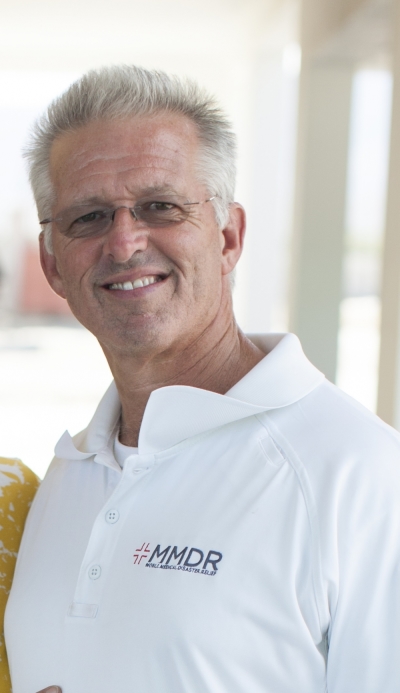How Simple Solutions Improved a Mother's Life in Haiti

Less than 650 miles from the U.S., our neighbor, Haiti, hosts one of the worst infant mortality rates in the world and suffers maternal mortality rates 50 times higher than our nation.
While the death of any person is devastating, losing a mother often foists an average of six children onto a community already living on the knife-edge of survival. It was these desperate conditions that inspired us to focus on child and maternal health when we answered God's call to sell our home and medical practice in the U.S. and move to Haiti to serve full-time.
Last year, I met Gina, a Haitian mother of six who daily struggled to find enough food for her other children, and now this growing baby inside her was insatiably sapping her remaining strength.
Gina knew she needed help, so she enrolled in the LiveBeyond maternal health program, where she saw hundreds of women just like her, struggling to survive pregnancy in a harsh environment. After the first day, she left strengthened and with hope, all because her basic needs were met; needs that any mother in America expects and often takes for granted — a hot meal, prenatal vitamins, and education about proper care to raise healthy babies.
Early the next morning, we received word that Gina had gone into labor prematurely and delivered twin girls, each weighing two pounds. As we packed a medical kit into our truck, I thought of the services available to 24-week-old infants in Miami, one and one-half hours to our northwest: The babies would be placed in an incubator in a special intensive care unit, given IV resuscitation and breathing support, and would be fed through a tiny tube and provided the latest antibiotic at the slightest sign of infection.
But we weren't in the United States.
We trudged through a watery swamp and pushed through a cornfield to find an eight-by-eight-foot shack that would serve as our neonatal ICU for the next month. As we entered the dark room, a blast of sweltering heat and swarming flies first greeted us as we searched for the mother and babies. As our eyes slowly adjusted to the darkness, we saw Gina lying exhausted on the bed next to two tiny still bodies. She had struggled all night in the agony of birth in the darkness; alone.
Too wearied to nurse the babies, Gina was unaware they were already suffering the first stages of dehydration and were now too weak to draw from their mother's milk. Without the luxury of a well-stocked NICU, or IV fluids, we resorted to slowly feeding them Gina's milk with a spoon.
As each drop of life sustaining milk struggled down their little throats, the babies started to show signs of the sucking reflex that every healthy newborn uses to miraculously begin taking in nourishment. The sun was setting when my wife, Laurie, finished showing Gina and our Haitian nurse how to keep the babies nursing throughout the night. Even though Gina gave birth alone, she was alone no longer. She had the help she needed.
Sadly, Gina's story is not uncommon. We see women like Gina nearly every day in Haiti.
The main causes of maternal mortality — bleeding, infection, pre-eclampsia and obstructed labor — are all easily treated in the developed world. In Haiti, however, the mother often has no access to prenatal healthcare and gives birth alone without any skilled attendants.
We have known for many years that an adequate and balanced diet is necessary for good health. Since many women in developing nations struggle to find adequate nutrition for themselves, they fall behind nutritionally during pregnancy, depleting the mother's nutritional resources. They are more susceptible to routine illnesses as well as more lethal disorders like HIV and TB; however, with adequate nutritional support and prenatal vitamins they can thrive.
High blood pressure or pre-eclampsia during pregnancy can be easily treated with medication when diagnosed early — part of normal care here in the U.S. Hemorrhage and infection after delivery and obstructed labor, common causes of maternal death, can be easily managed with proper medications or procedures at the time of delivery. But in Haiti, early diagnosis and assisted deliveries are luxuries rarely heard of.
Gina is only one example of the thousands of lives changed through a few simple treatments and solutions. We, in developed countries, rightly invest millions of dollars annually to improve the lives of our mothers and babies. As the world becomes smaller and better connected, we need to make sure that we continue to share these life-giving blessings with our poorer developing neighbors.
Gina's story has a bittersweet ending. While one of her twins survived with modern medical intervention, the other succumbed to a cultural treatment prescribed by Gina's voodoo ancestors. As we shared the love of Jesus with her, Gina has turned away from these syncretic traditions and superstitions and has found faith in Christ, and knows she'll be reunited with her baby again one day. It is this heart change that can be most effective in bringing sustainable and healthy cultural change, and we pray we can see this spread throughout Haiti and the rest of the developing world.





























